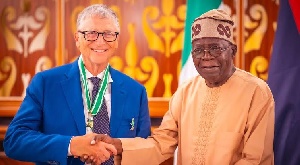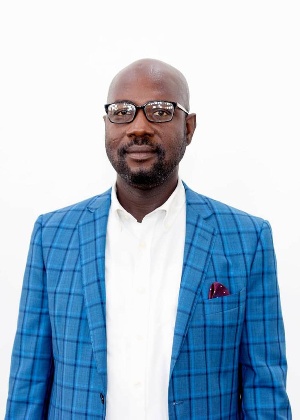Africa News of Thursday, 5 June 2025
Source: www.ghanawebbers.com
Nigeria: Gates Reaffirms Support for Health Innovations in Nigeria, Others Amid Fund Cut
Lagos — Bill Gates, Microsoft co-founder and philanthropist, pledged ongoing support for health innovations in Africa. He made this commitment during a roundtable discussion with journalists in Lagos on Wednesday. Gates acknowledged that global crises are hindering healthcare progress.
He stated, "We understand the world faces many challenges. Investing in health innovations is crucial for a better future." Gates expressed concern over funding cuts due to an executive order by U.S. President Donald Trump. This order banned foreign aid through the State Department and USAID.
"I'm very upset about the funding cut," he said. "We'll see more HIV deaths, malaria deaths, and maternal deaths." He emphasized that these funds were effectively used.
Gates pointed out Nigeria's insufficient health spending. This lack of funding contributes to high maternal mortality rates and disease outbreaks. "Nigeria's healthcare budget is very small," he noted.
He called for increased public funding and better governance to address these issues. Collaborative efforts between donors and governments are essential for building substantial health investments, he added.
"We can assist as partners," Gates said, "but the government must maintain a functioning health system." He advised countries to develop internal resilience instead of relying solely on donor support.
"In the long run, you can't depend on aid for essential health systems," he stated. Gates reiterated his foundation's commitment to Nigeria in areas like immunization and maternal health.
"Nigeria has the potential to lead Africa in health innovation," he said. However, investments must be made now for future dividends.
Earlier this week, Gates met with President Bola Ahmed Tinubu in Lagos before the foundation's Goalkeeper event there. He announced that most of his $200 billion wealth would benefit Africa over 20 years.
Gates emphasized partnering with governments focused on their people's well-being during his speech at the African Union in Ethiopia. He addressed over 12,000 officials and leaders about African leadership's role in driving progress.
"Investing in primary healthcare has the greatest impact on health," he noted. He highlighted how supporting mothers' nutrition leads to healthier children.
After his address, Gates participated in a discussion about Africa's development agenda with Dr. Paulin Basinga from his foundation. Prominent leaders like Dr. Ngozi Okonjo-Iweala called for collaboration and shared responsibility among nations.
Mrs. Graça Machel described current challenges as a "moment of crisis." She praised Gates' partnership with Africa as vital for addressing these issues.
Okonjo-Iweala stressed that strong leadership drives Africa's health progress through resilient communities and partnerships delivering results.
Gates acknowledged countries like Ethiopia and Rwanda as examples of effective leadership harnessing innovation for scalable progress despite limited resources.
"I've always been inspired by Africans' hard work," he reflected after two decades of engagement on the continent.
He also discussed artificial intelligence’s transformative potential for Africa’s future, praising young innovators embracing technology to solve local problems.
Gates compared this moment to Africa’s mobile banking revolution: "You have a chance to integrate AI into next-generation healthcare systems."
He cited Rwanda using AI-enabled ultrasound technology to identify high-risk pregnancies early, ensuring timely care for women.
This trip follows an announcement that Gates would spend $200 billion over 20 years to improve lives globally while giving away most of his wealth during that time frame.
The foundation aims to achieve three goals: end preventable deaths of mothers and babies; ensure children grow up free from deadly diseases; lift millions out of poverty toward prosperity before sunset operations at the end of 20 years.











